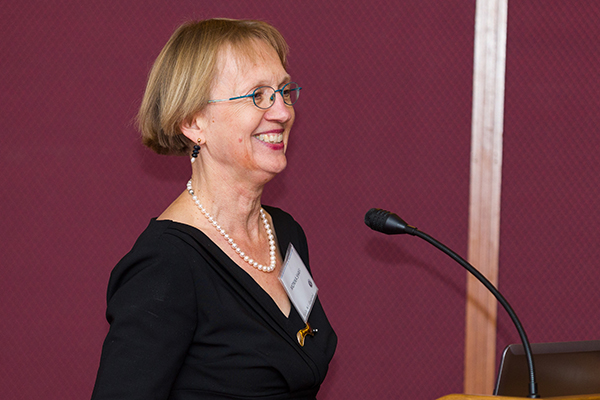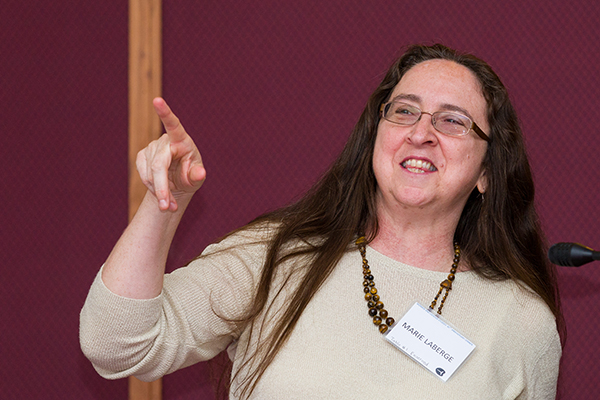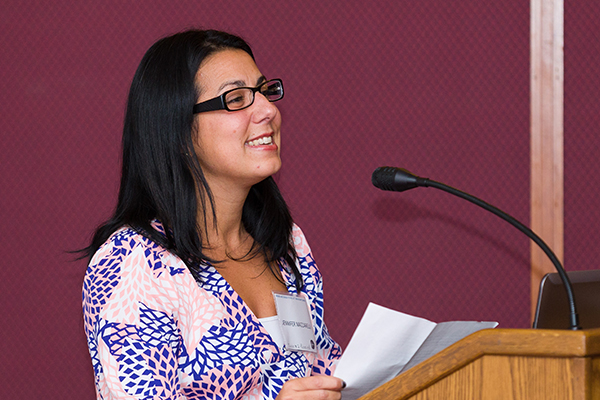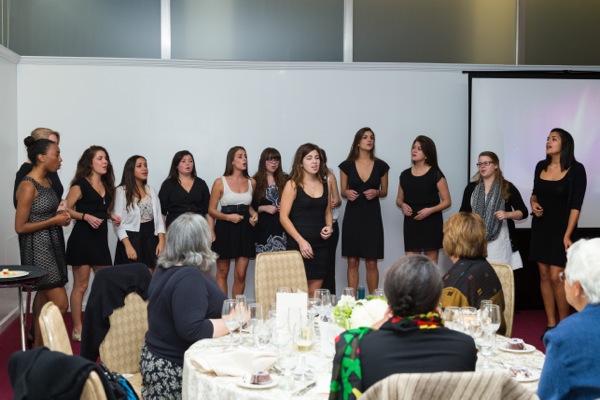


The evolving fabric
Women and Gender Studies celebrates 40 years at University of Delaware
1:49 p.m., Nov. 6, 2013--A lot can change over the course of four decades.
But turning 40 is something to celebrate, especially when that celebration is held in honor of a department born ahead of its time, surviving at points on the blood, sweat and tears of its founding mothers.
Campus Stories
From graduates, faculty
Doctoral hooding
This year, the University of Delaware’s Department of Women and Gender Studies hits that milestone, and a recent dinner — the second in a series of occasions this year to celebrate its achievements — was held to mark it. At the dinner, a documentary illustrating the department’s journey was also unveiled.
When the then-Department of Women's Studies celebrated its 20th anniversary at UD in 1993, a quilt was made. The names of many of the women at its foundation were inked into the fabric.
At 40, the struggles and victories and milestones and moments were woven into a more contemporary kind of quilt, one available in places like YouTube.
The video came from an oral history project embarked upon by Marie Laberge, assistant professor in the department, with interviews from more than 20 women, including those who laid the foundation for the program and those who continue to give it strength. The project, Women at the Center, is now located in Special Collections at the University of Delaware Library.
It was condensed to create the 20-minute documentary, Women at the Center: The History of Women's Studies, screened for the first time at the dinner. Laberge conducted most of the interviews between 2011 and 2013, and others were conducted by students.
“It will really be a tremendous use for historians, students and scholars,” department chair Monika Shafi said of the project. It relies on archival materials and oral histories gathered from women like 93-year-old Mae Carter, chair of the first women's studies committee in 1972.
“We felt it was important to get her history,” Laberge said.
The beginnings
The UD women's studies program was one of the first of its kind, germinating in 1971 under the leadership of then-University president, E. Arthur Trabant. That year, Trabant appointed a committee to study opportunities for women at UD and a subcommittee to develop plans for a women's studies program.
It was born out of the feminist movement of the time, Shafi said, with the roots of the program grounded in activism.
“It was activist women who began to question why women weren't being included in traditional disciplines on college campuses,” former associate chair of the department and assistant professor Jessica Schiffman says in the documentary.
But in those early days, getting the program off of the ground was a labor of love.
“There was quite a bit of hostility,” Shafi said. “Some thought it was not a serious academic pursuit.”
But by the time the first women's studies class was held in fall 1972, those hostile opponents were proved wrong. It was taught by 19 faculty members; 95 students enrolled.
It became one of the first interdisciplinary programs on campus when it was formalized as the Women's Studies Interdisciplinary Program in 1973.
But in 1976, the future of the program fell into uncertainty. A core group of faculty was sent by Helen Gouldner — late dean of the College of Arts and Sciences and the first woman to hold that position — to a retreat for developing ideas for needed structural changes.
By 1978, the women's studies minor was created. The major was approved 15 years later, graduating six students in its first year. In 2010, women's studies achieved status as a department and formally changed its name to the Department of Women and Gender Studies in 2012, reflecting the current focus of the field.
Issues remain relevant
And though the country has seen several wars fought and resolved, the flames of presidential scandals put out and major political systems and governments fallen since its birth, the issues addressed in women's studies are no less relevant today, supporters say. Classes fill to capacity. Both the major and minor continue to grow.
“There are still wage gaps, glass ceilings,” Shafi said. “There is not equal political representation of women.”
And there is a high incidence of sexual assault and rape among college-age students, added Jennifer Naccarelli, associate department chair and assistant professor.
In 2010, the department was awarded a $187,000 Verizon Delaware grant to create a concentration in Domestic Violence Prevention and Services.
UD is the first to offer such a curriculum to undergraduates, Naccarelli said, and it is directly informed by the field. It represents a union between activists and academics, incorporating current research and best practices. Students gain real-world experience and graduate with jobs in the field or related graduate school placement.
In the spring, the department will host a national conference on the Violence Against Women Act. It is also becoming more focused on global feminist issues, celebrating transnationalism and the issues that affect women across the world.
Naccarelli said she is energized by the prospects of women and gender studies defining itself as a department, continuing the mission of service-based learning and fully integrating sexual and gender studies.
“We want to focus on sex and gender studies, global feminist issues, and advocate against sexual assault,” said the chair. “Those are the key points for the next 40 years.”
In looking back over the last four decades, for Laberge, Shafi and Naccarelli, the highlights don't stand out as single moments. Rather, the highlight is itself the ability to look back, to see how far the program has come, to examine its evolution and to see the impacts it's had on two generations of women.
“When you're doing all the day-to-day stuff, you're not thinking about the significance until you turn around and look back and say, “Holy cow, look what we did!” said Laberge.
Article by Kelly April Tyrrell
Photos by Kevin Quinlan











